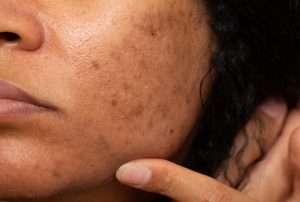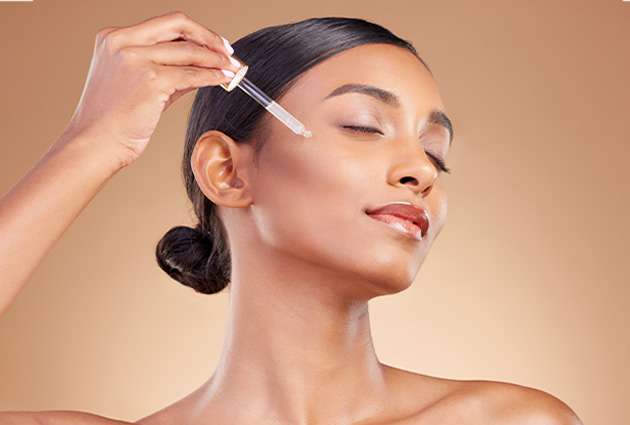5 Reasons and Causes Of Skin Darkening

Who doesn’t crave that healthy, radiant skin that seems to glow from within? We all put in the effort to keep our skin looking its best, yet there are times when it appears darker and less lively, especially when it affects our face. But why does this happen? Well, it can be a natural part of aging, or it might indicate something more serious.
The color of your skin isn’t set in stone; it can change over your lifetime for various reasons. Sometimes, health issues come into play, leading to changes in your skin color. For instance, hypopigmentation can cause skin lightening, while hyperpigmentation can lead to skin darkening.
Skin discoloration can take the form of big patches or small spots and can be due to aging or an underlying health condition. Skin darkening can stem from different causes, but you can take steps to prevent or treat it with simple home remedies and treatments.
Keep reading to know the skin darkening reasons and effective ways to treat it.
Related Product – Kojic Acid Cream
Related Product – Tranexamic Acid
Understanding Skin Darkening Causes
Skin darkening, often referred to as hyperpigmentation, is a common concern that requires us to be mindful of the products we use on our skin. Several factors can lead to skin appearing darker and less vibrant. Understanding these skin darkening causes is key to addressing them effectively.
Harsh Chemicals in Skincare:
The products we apply to our skin can sometimes be the culprits behind skin tanning. Your facial skin is delicate compared to the rest of your body, so regular skincare products can lead to issues like dry patches, age spots, blemishes, and hyperpigmentation. Some cosmetic products with harmful ingredients might even trigger acne and scarring, further contributing to discolored and darker skin.
Sun Exposure:
Prolonged and excessive exposure to the sun can stimulate the production of melanin, the pigment responsible for the skin’s dark color. This can result in your facial skin appearing darker and less radiant, especially if you spend a lot of time outdoors without adequate protection.
Past Skin Damage:
Post-inflammatory hyperpigmentation occurs when your skin produces excess melanin in response to prior injuries or irritations. This can lead to darker skin in areas where you’ve had allergic reactions, injuries, acne, scars, or other forms of inflammation. Addressing the underlying skin inflammation is the primary way to treat this; as it diminishes, your skin will naturally lighten.
Melasma:
Melasma is a skin disorder often triggered by hormonal imbalances, including those during pregnancy. It can lead to the development of hyperpigmented patches, especially on the face, forehead, cheeks, nose, chin, and stomach, resulting in dull and uneven skin tone.
Pregnancy:
Hormonal changes during pregnancy can cause skin cells to produce more melanin. If you’re noticing your facial skin darkening during pregnancy, it’s likely due to these hormonal shifts. Darkened patches or skin spots may also appear elsewhere on your body. Fortunately, these changes often fade after childbirth, but extended sun exposure during pregnancy can increase the risk of skin tanning.
Addison’s Disease:
Addison’s disease is a medical condition where the adrenal glands don’t produce enough hormones, leading to darkened skin on areas like the cheeks and lips. If you notice unexplained dark spots on your skin, consult a doctor who may prescribe medications to address hormone deficiencies.
Aging:
As we age, the ability of skin cells to produce melanin decreases, while existing skin cells increase in size and become more concentrated. This imbalance can result in hyperpigmentation and uneven dark spots, often seen as signs of premature aging, such as age spots, particularly after reaching your forties.
Medications:
Certain over-the-counter medications may have side effects that lead to facial skin becoming hyperpigmented. These medications may include tricyclic antidepressants and antimalarial drugs. Allergic reactions to medications can also cause your skin to appear gray.
Remember that it’s essential to consult a dermatologist or healthcare professional if you’re concerned about any skin issues, as they can provide personalized guidance and treatment options.
How to Prevent Skin Darkening?
Preventing skin darkening is essential for maintaining a healthy and radiant complexion. Here are some practical tips to help you keep your skin looking its best:
-
Use Sunscreen:
Sunscreen is your best defense against sun damage. Whenever you’re exposed to sunlight, apply a broad-spectrum sunscreen on your face. Make sure it has adequate SPF to shield your skin from harmful UV rays.
-
Cover Up:
When heading outdoors, consider wearing a wide-brimmed hat, sunglasses, and a scarf. These not only protect your skin from the sun but also help shield it from dust and pollutants, preventing damage.
-
Choose Skincare Wisely:
Be mindful of the ingredients in your cosmetics and skincare products. Avoid products that contain harsh chemicals, as they can contribute to skin darkening. Look for products designed to control skin darkening and combat signs of aging, like Skinkraft’s Skin Lightening Serum.
-
Remove Makeup Before Bed:
Always remove your makeup before going to sleep. Leaving makeup on overnight can lead to clogged pores, breakouts, and skin damage. Make it a bedtime ritual to cleanse your face thoroughly.
-
Understand Your Skin:
Know your skin type and its specific needs before building a daily skincare routine. Tailoring your skincare regimen to your skin’s unique characteristics can help prevent various unwanted skin issues.
Incorporating these practices into your daily routine can go a long way in preventing skin darkening and maintaining a healthy, glowing complexion. Remember that consistent care and protection are key to keeping your skin at its best.
5-Step Skincare Routine for Treating Skin Darkening
Achieving clear, even-toned skin and addressing dark spots and hyperpigmentation may require a dedicated 5-step routine. It’s important to commit to this routine for at least three months to effectively gauge its impact on your skin.
Here’s how to get started with a specialized skincare regimen for treating skin darkening
Step 1: Choose the Right Face Wash
Cleansing is the initial and crucial step in any skincare routine. It rids your skin of unwanted oil, dirt, dust, and grime. Opt for a gentle, sulfate-free face wash to prevent any potential allergic reactions on your skin. This mild cleanser is the foundation of your skincare journey.
Step 2: Gentle Exfoliation with a Face Scrub
Exfoliation is a natural process where the skin sheds dead cells as new ones form. However, as we age, this process, known as desquamation, can slow down, leading to dull and darker skin. To counteract this, skincare experts recommend incorporating gentle exfoliation into your routine on a weekly basis. This helps remove dead cells, promoting a more vibrant complexion and encouraging healthy skin cell turnover.
Choose a face scrub that is mild and suitable for your skin type to avoid over-exfoliation and irritation. You can also use the scrub for different body parts like underarms, knees, elbows, and other intimate areas. After scrubbing apply a soothing and calming cream that’s best for treating skin darkening.
You can consider using Pineapple 3% Kojic Acid Cream which is safe and gentle on skin and effective in treating different issues of skin. It helps to tighten your skin. It is an absolute treat for your delicate, sensitive spots! You can get softer & even-toned bum, thighs & hips. The cream helps to reduce melanin production & lightens dark patches in your intimate areas.
Step 3: Incorporate a Face Serum
Face serums are versatile and effective skincare products that can address a range of concerns, making them a valuable addition to your routine. They are known for their ability to lighten the skin, reduce signs of aging, treat acne and scars, and provide essential hydration. If you’re dealing with darker skin, consider opting Best Face Serums designed to rejuvenate your complexion.
You may add our Pineapple 3% Tranexamic Acid face serum into your nightly skincare regimen to enhance skin cell turnover. This hyperpigmentation serum can complement your existing skincare products and deliver noticeable improvements with regular use. It’s designed to reduce discolorations, even out your skin tone, and leave your skin with a radiant glow. Additionally, tranexamic acid for face is effective in healing red scars and patches caused by post-inflammatory erythema (PIE). The potent fruit and active formula in this serum have a rejuvenating effect on your skin, promoting a more youthful appearance.
Step 4: Use Dedicated Face Moisturizers
When putting together an anti-aging skincare routine, consider selecting a face moisturizer enriched with vitamins. Medicated creams can be effective in addressing signs of aging, age spots, and sunspots. Additionally, look for facial creams that contain niacinamide and retinol. These ingredients can significantly improve your skin’s texture, rejuvenate cells, and lighten dark spots, contributing to a more youthful appearance.
Step 5: Shield Your Skin with Sunscreen
Sunscreen is an absolute must in your skincare regimen. In fact, it should be the final step in even the simplest skincare routine. UV rays can pose a significant threat to your skin. Unprotected exposure to these rays can disrupt melanin production and lead to the development of dark spots and deposits on the skin. By applying a broad-spectrum sunscreen, you provide vital protection against these harmful effects, helping to keep your skin looking its best and preventing further skin darkening.
Final Thoughts
Skin darkening can be due to various factors, and hyperpigmentation might take some time to fade, but with the right care, you can effectively treat it. A consistent skincare routine can make a significant difference. It’s essential to stick to your evening (PM) Basic skin care routine since your skin goes into repair mode at night, allowing treatments to work more effectively.
If your skin appears darker for no apparent reason, it’s advisable to consult a dermatologist for a professional evaluation and guidance. Additionally, staying well-hydrated, engaging in regular exercise, and maintaining a diet rich in fresh fruits and vegetables can contribute to overall skin health and radiance. Remember that taking a holistic approach to skincare and health can have a positive impact on your skin’s appearance.














